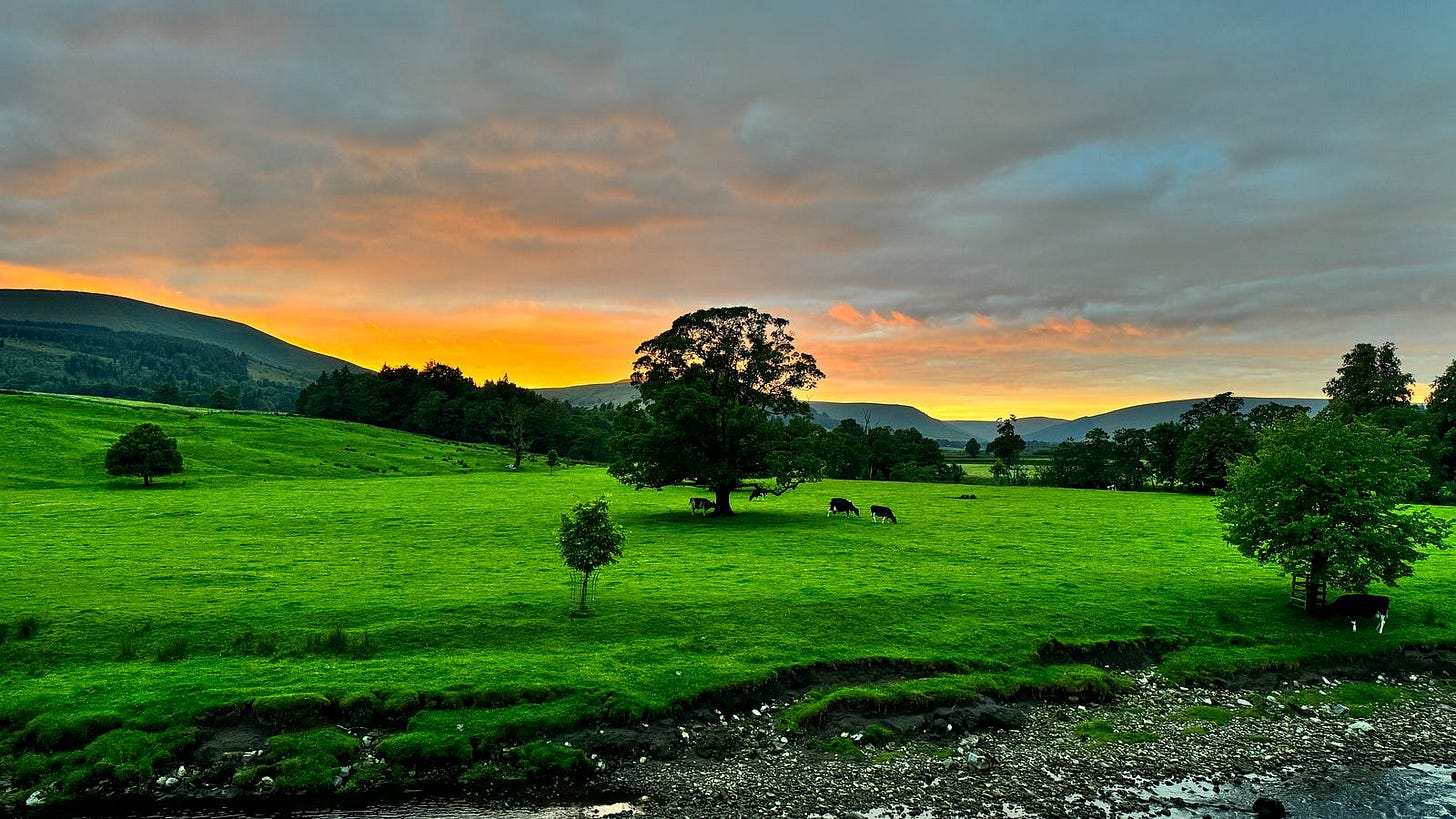
Søren Kierkegaard, a 19th century Danish philosopher, argued that much of humanity sleepwalks through life, moving through the world driven by habit and convenience, unaware of the deeper realities shaping their existence. In his “Either/Or” (1843), he suggests that people tend toward different manifestations of living; the aesthetic life (driven by superficial pleasures and distractions), and the ethical life, (grounded in deeper reflection and responsibility). He argued that we focus on the immediate; what is easy, comfortable, and familiar, not really stopping to question the systems we perpetuate or the values we prioritise.
This perspective is unsettling because it suggests that the structures we take for granted are not inevitable but the choices we make, often unconsciously. The challenge, as Kierkegaard warned, is that waking from this sleepwalking state is not the hard part… it’s choosing to stay awake and confront what lies before us.
I think that we can use this sleepwalking metaphor to help us to understand the conflict in our current economic and social systems; at a global level, but also at a local level.
The thing that strikes me, though, is that this situation we currently find ourselves in, i.e., profit over people, shareholder driven businesses, outsourcing, and “lean” strategies, has not always been the case.
In fact, this context is something that we, consumers, investors (including superannuation), and corporations, have created and supported (perhaps unwittingly) since the 1970s. Around this time, there was a pivotal shift in the Western economic landscape, one that fundamentally reshaped how we view work, labour, and the role of business.
As the post-war prosperity of the 1950s and 1960s unravelled and product orientation shifted, stagnation and inflation overwhelmed countries like Australia, the United Kingdom, and the United States. For businesses, shrinking profits and declining market shares led to new strategies.
What came out of this unsettled time was a financial orthodoxy that would define how we run businesses, i.e., the belief that corporations exist solely to maximise returns for shareholders. The contours of this approach, built around objectives and competitive environments, would go on to infiltrate all manner of life, including non-profits, schools, hospitals, universities, and arts organisations.

This idea, presented as a democratic innovation, promised middle-class prosperity through the redistribution of corporate wealth via superannuation and pension funds. In Australia, compulsory superannuation, introduced in the early 1990s, reinforced this narrative, as ordinary workers were now positioned as beneficiaries of corporate success. On the surface, it seemed an inclusive and empowering shift. But beneath this rhetoric, a profound transformation in corporate priorities began to take shape.
Institutional investors, super funds, and other financial investments used deregulation to pressure corporations for higher and faster returns. The emphasis shifted from reinvesting in communities and employees to maximising short-term profits.
This change wasn’t limited to financial policy; it was reflected in the way we use language. What were once called personnel, a term that recognised the individuality of workers, was rebranded as human resources. Workers became just another input in the production process, akin to machinery or raw materials and finances, to be optimised, extracted, and, if necessary, discarded when needed.
The results of this shift were swift and dramatic. Executive pay and bonuses were (and are now) tied to stock performance, aligning the interests of CEOs with shareholders and peers rather than the community, employees, or customers. Cost-cutting became an art form.
By the late 1990s, layoffs were no longer a survival tactic in difficult times but an intentional corporate strategy to boost profit margins and shareholder returns.
Workers, once considered integral to a company’s success, were now seen as expendable resources, easily replaced when needed. Yes, of course workers have been exploited since the beginning of time, but this was a shift in thinking was a significant cultural change in the relationship between employers and employees.
This change was particularly stark in contrast to the ethos that had once defined smaller businesses in towns and regional centres. Growing up, many of us experienced the local butcher, grocer, department store, or factory owner treating their employees as family, fostering relationships in the community that were built on trust and loyalty. Workers were not just labour; they were part of a community. Business owners understood that their success was intertwined with the well-being of their staff.
Make no mistake, I have no attachment to the ideals of the picket fence or the nostalgia behind Make America Great Again, nor do I view that era through rose-coloured glasses. Yes, choices were limited, prices were high, and it was far from an idyllic experience for everyone, but the focus extended beyond purely economic measures of a “good life”, which seem to dominate our discourse now.
It’s arguable that the rise of shareholder capitalism and the relentless push for efficiency, low costs, and more choice driven by governments, regulators, corporations, and consumers eroded these bonds. The logic of corporatism, built around the idea of exploiting resources, including people, dominated.
Which brings us to an uncomfortable truth.
As consumers, I would argue, we have been complicit in this transformation.
As Kierkegaard might say, the structures we take for granted are not inevitable but rather choices we make, often unconsciously.
We demand lower prices for everything, from clothing to groceries, with huge numbers of us using platforms like Shein, Temu, MilkRun, Uber, and Amazon that promise bargains and ridiculously fast delivery. We love it. We demand instant gratification, 24-hour convenience, and endless choice without stopping to question the human and environmental costs. Businesses have responded by erasing any sense of inconvenience, reshaping their operations to meet our insatiable appetite for immediacy… and we have lapped it up.
Even as we demonstrate against exploitative labour practices or environmental degradation, we participate in systems that support and exploit them. Every purchase from a discount retailer, every Uber ride taken, and every fast-food delivery ordered reinforces the demand for cheaper, faster, and more efficient services.

At the personal level, we copy the behaviours of the corporations that we critique. Corporations exploit tax loopholes to maximise profits, but we also look for ways to minimise our own tax burdens (have you ever paid cash to get a 10% discount?), justifying it as fairness or necessity.
Both actions stem from the same drive to retain more for less, feeding into a system that prioritises individual gain over collective well-being.
Technology has also complicated this landscape. Many would argue that it is a democratising force, but it has also made exploitation more efficient and, perhaps a little more invisible. We may be aware of some of this exploitation, but we distance ourselves from it.
Technology platforms turn workers into data points, commodifying people through algorithm-managed efficiencies. When we use an app to order a meal or a taxi, what we see is the convenience, not the labour conditions of the driver or the delivery worker. This psychological distance makes it easier to ignore the human cost of our demands.
Psychology and evolutionary history can help us to understand this behaviour. Humans are wired to value immediate rewards over long-term benefits, a bias known as hyperbolic discounting. This explains why we choose cheaper goods even when we know they are produced under exploitative conditions.
Our innate drive for social comparison, a desire to keep up with societal norms or maintaining status, underpins our demands for more at lower cost. The general discourse in society around how we get the lowest possible prices demonstrates how we have reduced the customer experience to one measure, price. The diffusion of responsibility allows us to rationalise harmful choices, convincing ourselves that one purchase or action won’t make a difference.
This is the “tragedy of the commons” writ large.
Corporations, consumers, and governments all act in ways that prioritise short-term gain over long-term sustainability, depleting shared resources, whether labour, community, or the environment, for fleeting benefits. The paradox is clear: what was promoted as a model of shared prosperity has entrenched inequality, fragility, and disconnection. The promise of convenience has come at a profound human cost.
But, the challenge of addressing these dynamics is not one of finding a simple, one-step solution. The problem is far more complex, underpinned by the reality of what it means to be human. Our evolutionary history has hardwired us with biases that make it difficult to prioritise long-term collective well-being over short-term individual gains. Our modern systems, designed to maximise efficiency and profit, exploit these tendencies, reinforcing cycles of consumption, convenience, and inequality.
What is required is not just a shift in corporate priorities or consumer behaviour but a fundamental rethinking of governance and government itself. Current systems, built on the assumption of endless growth and individualism, are ill-equipped to address the complexities of a world that demands more equity and sustainability. A new framework is needed, one that challenges the corporatist mindset and places collective well-being and long-term thinking at its centre. But this requires sacrifice, not just from corporations but from individuals. We have to accept that such a shift means letting go of many of the conveniences we currently demand — endless choice, instant gratification, and low costs — because these conveniences are the foundation upon which exploitation is built.
The thing is, we’ve done this before. And very recently.
For nearly two years, the Covid-19 pandemic forced the world and people to pause and re-evaluate their priorities. Lockdowns disrupted the rhythms of consumption and convenience, forcing people to find ways to connect with each other in different ways and to adjust their expectations of what was available and when. Supply chains slowed, shops closed, and travel stopped, but in that slowing, lots of us rediscovered the value of simplicity, community, and time.
Don’t get me wrong. I am not saying that the Covid period was some ideal utopia.
If anything, it starkly exposed the harsh inequalities that underpin our world. Those already marginalised were often the hardest hit, while those with privilege were insulated from much of the disruption.
Yet, in exposing these inequalities, the pandemic forced us to reckon with them in ways that our contemporary, corporate mindset — growth at all costs, efficiency over community, and convenience, pleasure and distraction over reflection and responsibility — allowed us to ignore.
But what it did show us is that societies can function with less convenience and that our expectations can adapt. For some, it was a moment of rediscovery; a chance to see the value in community, time, and simplicity. For others, it was a wake-up call, a reminder that the systems we take for granted are choices we make.
And yet, as soon as the opportunity arose, many of us were desperate to return to “normal,” reinforcing Kierkegaard’s warning that waking up is not the hard part; it’s staying awake. It exposed some pretty uncomfortable truths about who bears the burden of the systems we uphold and who truly benefits. These were truths we had perhaps always known but had been too distracted to confront.
Reimagining our systems demands a reckoning with these truths. Governance and government must change, prioritising collective well-being and long-term sustainability over short-term profits and convenience. We also need to change our expectations of what represents a good life.
Consumption and exponential growth (to the point of exhaustion) may not be the solution we were promised.
It’s not an easy fix. But, realistically, nothing in life is… despite what TedTalks and airport self-help books tell us. It requires sacrifice, not just from corporations, but from us too.
What it might mean is for us to let go of the comforts and conveniences we have come to see as entitlements.




